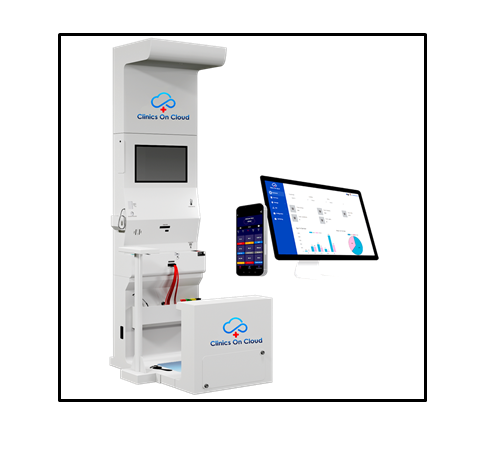Revolutionising Healthcare Access: Clinics on Cloud’s HealthATM Brings Preventive Diagnostics to Millions

In an era where healthcare accessibility and affordability remain critical challenges, Clinics on Cloud emerges as a beacon of innovation and hope. This pioneering health tech company has taken significant strides to bridge the gap in healthcare services through its revolutionary HealthATM platform, transforming the way communities access essential medical services.
Clinics on Cloud stands at the forefront of the health tech industry, driving forward with its commitment to address global healthcare challenges. Their flagship platform, HealthATM, seamlessly integrates basic health checkups and consultations, offering individuals a convenient and efficient way to access high-quality medical care.
Vision and Mission:
Guided by the vision of “HEALTH FOR ALL,” Clinics on Cloud is dedicated to making preventive diagnostics accessible to everyone. Their mission centers on alleviating the burden of illness and healthcare costs globally by providing affordable and instant health checkups through HealthATM. With a vision of placing one health kiosk every 2 kilometres, Clinics on Cloud aims to ensure healthcare is within everyone’s reach.
Key Initiatives:
HealthATM Platform: The cornerstone of Clinics on Cloud‘s innovation, the HealthATM platform, harnesses cutting-edge technology to deliver essential health services to underserved communities. With over 2,500 HealthATMs strategically installed across India, Clinics on Cloud is expanding the reach of preventive healthcare, improving health outcomes for countless individuals. Each HealthATM can check over 60 health parameters in less than 10 minutes, ensuring quick and comprehensive health assessments.
Telemedicine: Clinics on Cloud’s telemedicine feature brings doctors to patients’ screens, providing remote consultations with access to all necessary health reports. This ensures timely medical advice and reduces the need for physical visits, especially in remote areas.
Digital Reports: The platform generates digital reports, allowing patients to review their health records with a click, facilitating better follow-up and continuity of care.
Partnerships: Clinics on Cloud has established strategic partnerships with Public Sector Undertakings and government projects, enhancing the accessibility of their services. By collaborating with these initiatives, Clinics on Cloud is bringing quality medical services closer to people, addressing healthcare disparities in numerous communities.
Impact and Reach:
Since its inception in 2017, Clinics on Cloud has made remarkable progress in the healthcare sector. With operations spanning over 200 cities and a robust presence across India, the company has positively impacted millions of lives. By providing access to essential health checkups and telemedicine facilities, Clinics on Cloud is playing a pivotal role in transforming healthcare accessibility. The company’s focus on prevention over cure ensures that communities stay healthier and reduce the burden of chronic illnesses.
In summary, Clinics on Cloud‘s innovative HealthATM platform is not just a technological marvel but a significant leap towards equitable healthcare. Through their unwavering commitment to “HEALTH FOR ALL,” Clinics on Cloud is making a profound difference in the lives of individuals and communities, one HealthATM at a time.
To learn more about Clinics on Cloud and their groundbreaking initiatives, visit [Clinics on Cloud](https://clinicsoncloud.com).




